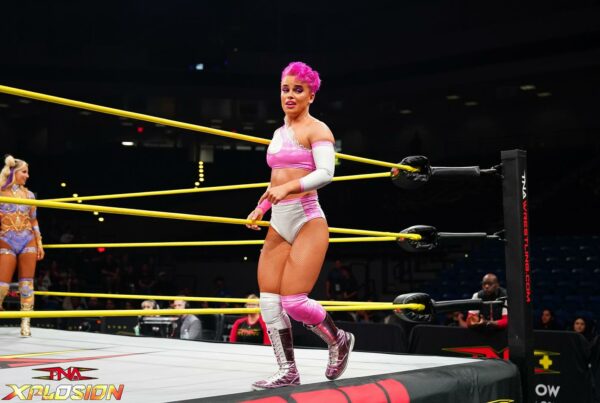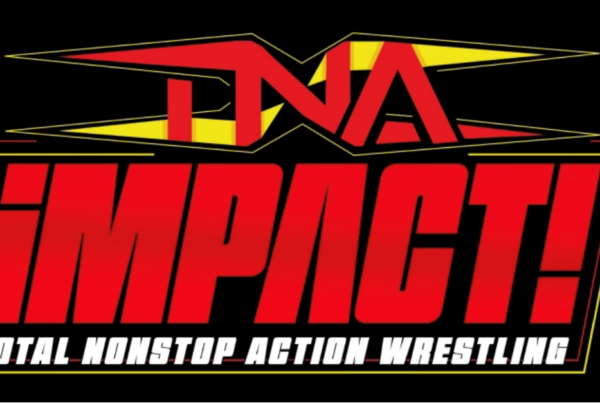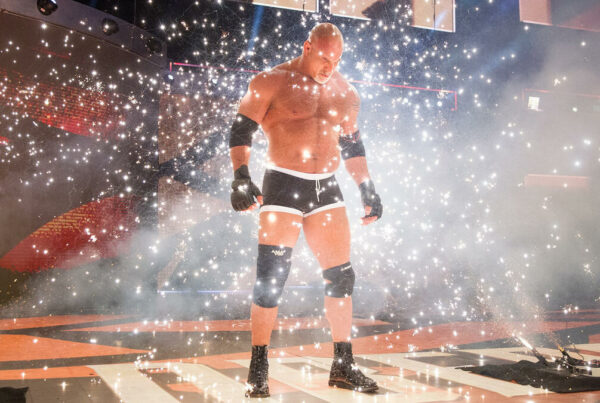
Sean Durkin’s respectful, incisive, and gruelling dramatisation of The Von Erich Curse captivates whilst not quite packing the punch it could.
The following review contains SPOILERS.
In an industry with no shortage of tragic figures, the story of the Von Erich family may be the most depressing and tragic of them all. Headed up by patriarch Fritz Von Erich – a star attraction in the National Wrestling Alliance and World Class Championship Wrestling, yet one who never managed to hold the NWA’s World Heavyweight Championship; a slight which, along with the accidental death of his first son, Jack Jr., at the age of six, cast a bitter chip on his shoulder and a belief the family was cursed – he effectively brute-forced his five sons into becoming a wrestling dynasty, regardless of whether they had the desire to.
Kevin, the oldest, groomed from day one to be the star of the family at Fritz’s own WCCW promotion, yet subjected to the most vicious of his father’s emotional abuse every time he failed to measure up. David, the once-in-a-generation superstar talent with both in-ring and on-mic flair who overworked himself at Fritz’s behest and died right as he was about to ascend the top of the mountain.
Kerry, the would-be Olympian whose window unfortunately coincided with America’s boycott of the Russian Olympics, thrust by Fritz into pro wrestling and forced to internalise the patriarch’s toxic ideas of masculinity and impatience which slowly cost him every part of himself (including a literal part of himself in a horrific motorcycle accident). Mike, the brother with no interest at all for getting in the ring, slotted into David’s place by Fritz and paying the ultimate price for it. Chris, the youngest, the shortest, the weakest despite wanting so badly to be like his older brothers, an albatross he would never be able to successfully outrun.
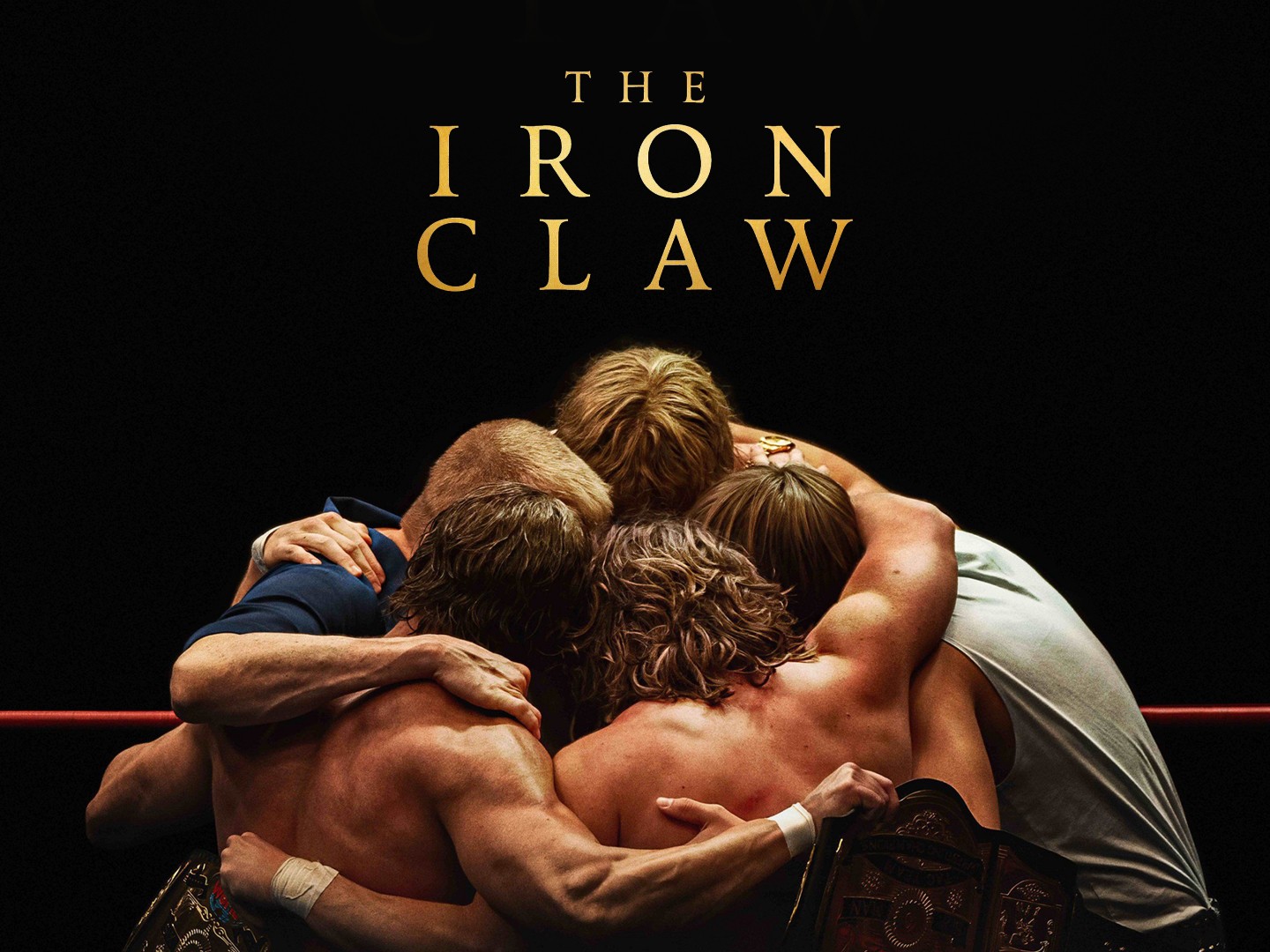
The Iron Claw tells the story of the Von Erich family.
One by one – through a combination of freak accidents, overwork, drugs, and mental instability which could in large part be traced back to Fritz’s treatment of them all – the sons died, until only Kevin was left. There is a famous heartbreaking quote attributed to Kevin – albeit one I have been unable to find the direct source for – where he notes “I used to have five brothers, now I’m not even a brother.” Wrestling may not have been directly responsible for the tragedy of the Von Erichs, but it’s become etched into wrestling folklore as one of its biggest cautionary tales. A curse whose effects were, in fact, all too tangible and easy to attribute.
In that respect, this makes their story a very fitting one for Sean Durkin to follow up his 2021 drama The Nest with. The Martha Marcy May Marlene writer-director’s sophomore feature examined an attempted 80s capitalism success story being torn apart by a coldly distant patriarchal figure imposing his will upon a dissatisfied family and refusing to take any responsibility for the damage he’s wrought. Martha Marcy, meanwhile, sensitively explored the lingering psychological torture that abuse inflicts upon its victims even long after they get out from under their abuser’s thumbs. In a story which carries the very real risk of being realised in an exploitative or melodramatic manner, Durkin is perhaps the safest pair of hands you could put the Von Erich story in.
The Iron Claw, then, delivers pretty much exactly what you would expect from this material with this creative. It is an emotional pressure cooker of a film, yet one realised with sensitivity and respect, refusing to give into salaciousness or go full despair.
It is, however, an imperfect one, maybe a little too respectful to fully detonate the emotional nukes it has in storage – or, perhaps, I just saw it at the worst possible time to be able to feel it completely (and that’s all I’m comfortable saying here). Allegedly to avoid the risk of audiences thinking the true story was unbelievable in its bleakness but perhaps also because very little of his story reflects well on any member of the family in today’s eyes, Chris Von Erich has been cut out entirely from this telling; his manner of death transferred over to Kerry. I’m not going to litigate the ethics of this creative decision, mainly because it gets us into debates about art which covers real-life events that’ll side-track us for hours, but it is worth noting all the same.
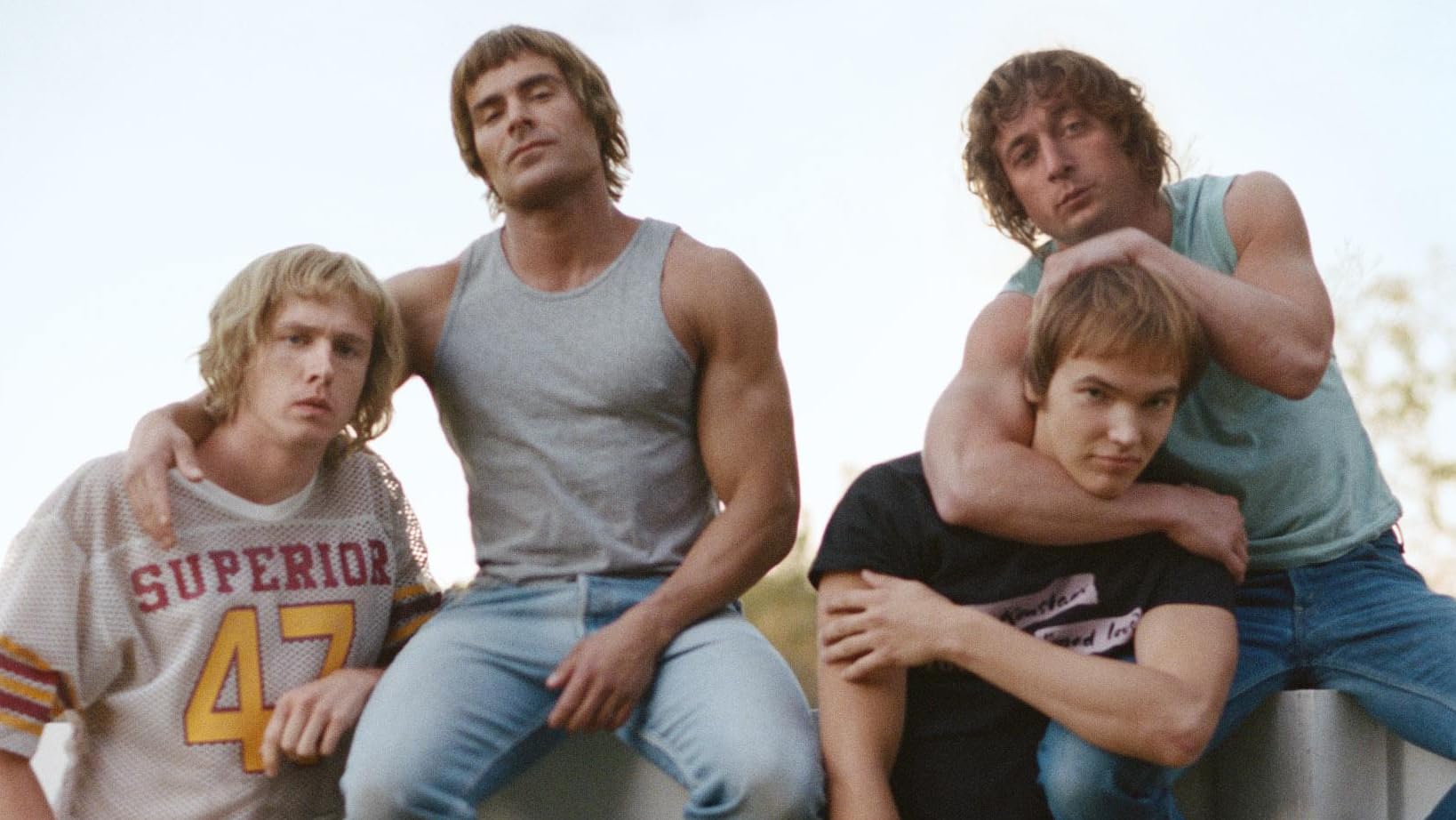
The Von Erich brother’s story is a fascinating but tragic one.
What I do think that erasure indicates, though, is a slight lack of nerve. Whilst not in the least bit some kind of uplifting fun times feel-good jamboree a lot of the marketing has tried to pitch it as, The Iron Claw does feel like a movie attempting to put a brave face on a story where the only real positive takeaway is Kevin still being alive and sound of mind.
Durkin’s screenplay spends almost the entire second-half going from tragedy to tragedy – in a manner that, due to the lack of date cards and his struggle to effectively communicate how much time is passing between events, feels a lot more compressed than it needs to be – yet his direction keeps a slight remove. He’s capable of setting up chill-inducing shots, such as when we finally see the aftermath of Kerry’s off-screen motorcycle accident, yet the delivery is almost always underplayed, sometimes coming off as overly muted. There is such a thing as being too respectful.
In other areas, however, Durkin’s reverential approach pays dividends. This is maybe the most loving and sincere tribute to territory-era pro wrestling yet put to film by somebody who isn’t outright connected to the business. The look is down pat: production designer James Price doing an excellent job at recreating the smoky barn-like hometown character of the Dallas Sportatorium, which cinematographer Mátyás Erdély shoots with a golden warmth where you can practically smell the stench from wrestlers and patrons alike.
The cadence of the promos, the exaggerated stiffness of the match choreography, the camaraderie and politicking between wrestlers, the utilitarian design of the locker rooms, the room-stopping aura when a national megastar like Harley Race walks into town and stands nose-to-nose with a Von Erich who’s just not quite on his level. It’s all recreated with the kind of detail that outs its creative team as lifelong wrestling nuts.
Underplaying also ends up being the absolute perfect approach for dealing with Fritz’s looming shadow around his family. In comparison to other recent abusive mentor/family figures in Awards Season dramas which may be invoked – such as J.K. Simmons in Whiplash and Allison Janney in I, Tonya – Durkin and actor Holt McCallany steer well clear of big showy scenes where Fritz tears his family down or unleashes the full force of his temper. Instead, the focus is placed on his daily microaggressions, commanding tone, and mercenary attitude towards what his children actually want.
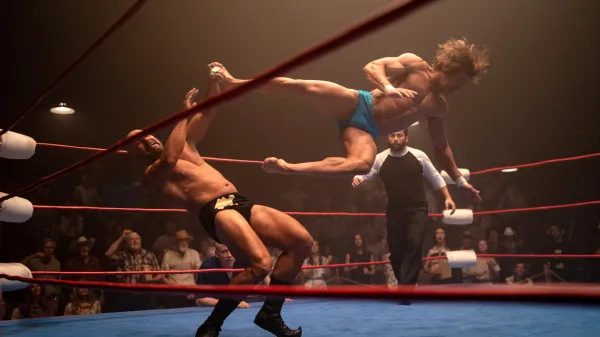
The wrestling scenes in The Iron Claw should please wrestling fans.
In my press screening, you could feel the energy in the room change as people who had no idea what Fritz was like went from laughing at the first invocation of ranking his sons, thinking it was a fun bit of masculine banter rather than a decree he was always deadly serious about, to disgusted exultations when he orders Mike back into the ring as soon as the kid recovers from a life-threatening coma. McCallany embodies the toxically banal evil of Fritz to a tee, a man who refuses to engage when his children need him most but is first on the scene to pour salt in the wound when they slip up with a word that is law like the carny sonuvabitch he is.
Much like The Nest, Iron Claw gains most of its power from the turns put in by actors such as McCallany. Harris Dickinson, someone who’d yet to make a real impression on me, bottles that superstar lightning David Von Erich was blessed with. In the ring and on the stick, Dickinson fully convinces as the kind of prodigal talent you’d build promotions around if only David had lived long enough; outside the ring, he exudes a loving brother radiance with such totality you feel the same sense of loss Kevin does after David’s passing.
Jeremy Allen White continues to burrow down effectively in his niche of troubled young men who become self-destructive the instant something goes wrong as Kerry, which is what makes his last scene all the more heart-wrenching once all that intensity melts away. Relative newcomer Stanley Simons brings a sweet vulnerability to Mike Von Erich, a youngest sibling puppy dog energy which nonetheless never dips over into caricature and only twists the knife deeper once Fritz’s poison infects Mike.
And then there’s Zac Efron as Kevin Von Erich. From the instant he steps out of bed into full-body shot, with exactly the kind of unhealthy steroid-aided physique golden age wrestlers and their promoters used to idolise, it’s clear that Efron has given his all to this role. A walking embodiment of Reagan-era American aspirational exceptionalism, the film and Efron’s performance proceed to spend much of the next two hours stripping away every aspect of that façade.
Lingering on painful physical injuries and steroid injections, Efron’s stilted promo deliveries befitting a babyface who just doesn’t quite have that It factor despite all his efforts, a low-humming resentment over never managing to be The Guy and shouldering the weight of Fritz’s disappointment, a pure-hearted love for his brothers crippled by a stunted emotional growth leaving him unable to find the right words to say, and an internalised idea of masculinity which treats vulnerability as weakness.
When Durkin, Efron, and The Iron Claw finally arrive at Kevin’s centre – still that scared child sat in the back of Fritz’s car in the late 60s, seeing his father angry and upset as he is first told about The Von Erich Curse – and he begins to let go of that destructive mindset… Efron’s tears won’t be the only ones flowing.
The Iron Claw will be released in UK cinemas from 9th February by Lionsgate.
Callie Petch came from tomorrow to take back today, they are the future. Follow them on X (Twitter) @CalliePetch and check out their other work (calliepetch.com).
